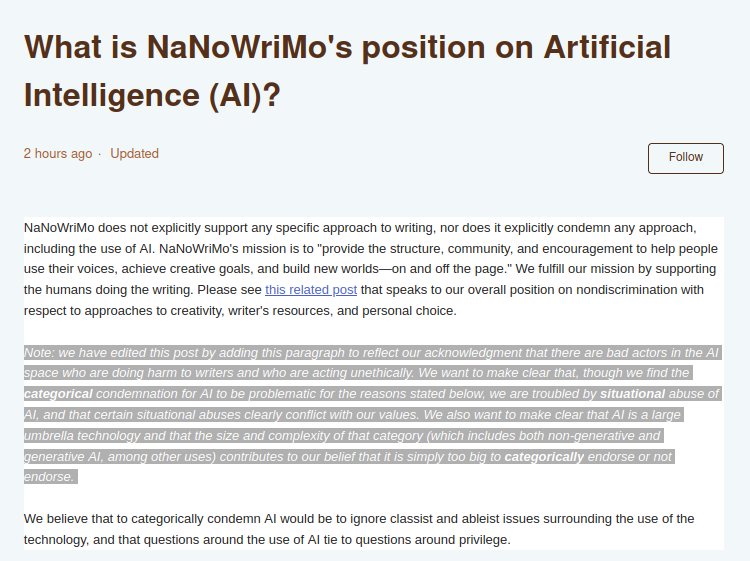

Note: I don’t know anything about the politics of the SerenityOS project or the people behind it.
revisiting this now to cringe at myself and just saw your edit haha
I write things on my blog sometimes https://fasterandworse.com/


Note: I don’t know anything about the politics of the SerenityOS project or the people behind it.
revisiting this now to cringe at myself and just saw your edit haha


Theranox


Microsoft launches ‘vibe working’ in Excel and Word
A new Office Agent in Copilot chat, powered by Anthropic models, is also launching today that can create PowerPoint presentations and Word documents from a “vibe working” chatbot.


I’m quite sure a part of my last job loss was due to my open refusal to use AI, which extended to my criticism of the use of AI-generated code being added to a codebase I was expected to manage and maintain. Being careful is seen as friction now, careful is translated as slow, no matter how much time is spent fixing things broken by shitty generated code, fixing is seen as productivity more than careful production is.


My new video about the anti-design of the tech industry where I talk about this little passage from an ACM article that set me off when I found it a few years back.
In short, before software started eating all the stuff “design” meant something. It described a process of finding the best way to satisfy a purpose. It was a response to the purpose.
The tech industry takes computation as being an immutable means and finds purposes it may satisfy. The purpose is a response to the tech.
p.s. sorry to spam. :)
vid: https://www.youtube.com/watch?v=ollyMSWSWOY pod: https://pnc.st/s/faster-and-worse/8ffce464/tech-as-anti-design
threads bsky: https://bsky.app/profile/fasterandworse.com/post/3ltwles4hkk2t masto: https://hci.social/@fasterandworse/114852024025529148


“businesses and employees”
the business pays for it, the employees “use” it.
the business measures the value by how many employees they can remove.
if the business is measuring “productivity”, how are they doing that? Is it jira tickets? Is it timesheets? are they measuring quality? Is it starting to seem like you’re trying to pick up water with your fingers?
if you pretend that ai ceos are actually doing marketing the trajectory is right there staring you in the face


fyi they updated their blog post with this catch-all disclaimer in the last couple of hours

“it is simply too big to categorically endorse or not endorse”
“so we’re gonna play it safe and endorse it”


also, thanks for the intro to “glowfic” - for a good chunk of my 20s I was obsessed with my side project which I called “plotplant” (dorky?) which was an infinitely forkable collaborative writing app. I never got it past a few different build attempts because I would always get caught in the weeds of how, if it were successful, the complexity of a story that had loads of branches would be navigated. My own personal xanadu. Anyway, this glowfic looks like a nightmare scenario that would keep me in them weeds, ruminating, “there has to be a better way!”
It’s so hard to read when every bit has all that meta info next to it! Written by Eliezer or not


this story takes place in a totalitarian state ruled by the literal forces of literal Hell
Look, I’m giving it a go but the very first line of the content warnings is a case of “is this written by a grown man or a 14 year old emo kid”
my €14 earbuds are holding my brains in